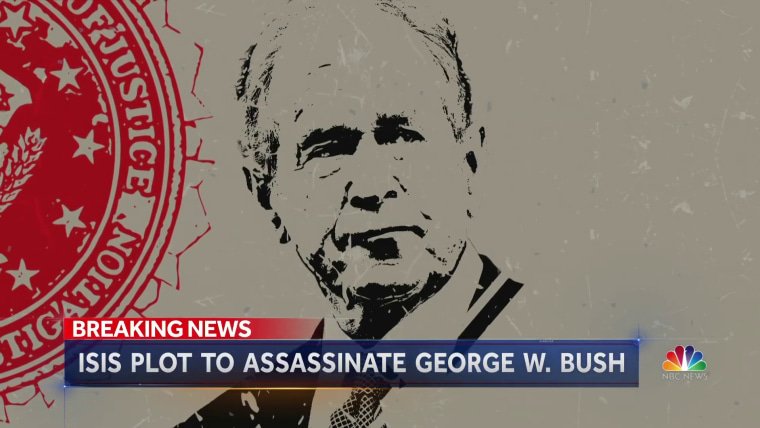Attention Span George W Bush Quote Attention Span George W Bush Quote Funny
Amid a horrifying news cycle, it's possible you missed the news last week that an Ohio man had been plotting to kill former President George W. Bush. A search warrant with intricate counterterrorism operational details was inadvertently unsealed, then quickly resealed, and an arrest on murder charges was made, all within 24 hours. It's a sensational story, to be sure: The 43rd president in the crosshairs of a would-be assassination peripherally connected to ISIS. But this case is worth paying attention to for the details that make it unique, and what it suggests about shifting terrorism resources in the U.S.
The 43rd president in the crosshairs of a would-be assassination peripherally connected to ISIS.
The FBI's sprawling affidavit against the key suspect, a man identified as Shibab Ahmed Shibab, describes the inner workings of a seemingly sophisticated human smuggling ring, a burgeoning terrorist plot, and a covert global terrorist network. The coming weeks and months of a likely lengthy judicial process will tell us if the court records are as concerning as they appear, but taken at face value the Shibab documents paint a picture of one of the more complex known U.S. terrorist plots in recent memory.
According to the FBI, Shibab entered the U.S. by questionable means in September 2020 and officially filed for asylum in March 2021, all the while allegedly running a burgeoning human smuggling operation. Shibab's associate in Columbus, Ohio, owned a car dealership that the two purportedly used to funnel smuggling payments. Another colleague served as the main point of contact overseas in Egypt, and is alleged to have helped smuggle hundreds of former Iraqi Baath party members into Europe after the fall of the Saddam Hussein regime. Together, the three were eyeing the U.S. for expanding their smuggling business, with Shibab acting as the connective tissue.

In conversations with two FBI confidential sources cited in the affidavit, Shibab discussed plans to smuggle Iraqi citizens from Iraq to Brazil and across the Mexico-U.S. border for a fee. But eventually Shibab claimed to have already smuggled in two individuals associated with Hezbollah, and also claimed to have fought alongside the Islamic State's predecessor, Al Qaeda in Iraq (AQI), against U.S forces. The FBI says Shibab further boasted about being a cousin of the now-deceased ISIS leader Abu Bakr al-Baghdadi and declared himself to be part of a global network of covert terrorist operatives now known as the Al-Raed ("thunder" in Arabic) network.
The affidavit lays out a complicated network spanning multiple countries. According to law enforcement, after the U.S. invasion of Iraq in 2003, a former Iraqi pilot for Saddam Hussein established the Al-Raed network to coordinate former Baath party intelligence officers and covert operatives through the network's leadership based primarily in Qatar. Al-Raed's shared ideology and history of fighting U.S. forces has led the group to work extensively with ISIS in the past.
The FBI now alleges that Al-Raed and ISIS partnered once more to plot the murder of former President Bush, with Shibab as the point man. Shibab and an FBI informant traveled to Dallas in February to begin surveilling the Bush residence and the nearby George W. Bush Institute. In multiple drive-bys, the FBI says the two filmed recordings of both potential targets and then returned to Shibab's hotel to discuss next steps, including acquiring armor-piercing firearms and police uniforms. Unbeknownst to him, the FBI was well involved in controlling the would-be plot. And a month after his trip to Dallas, Shibab was arrested.
Al-Raed's shared ideology and history of fighting U.S. forces has led the group to work extensively with ISIS in the past.
Of the 24 jihadist attacks we've recorded in the U.S. since 2014 and dozens of other failed plots, this alleged Bush assassination plot is unique for a few reasons.
First, the target. It is relatively novel for U.S.-based jihadist plotters to singularly target high-profile figures. Their focus tends to be either much lower-level individuals or vulnerable public spaces and sites where plotters believe they can inflict the most damage. While terrorists would no doubt consider killing a well-known victim to be a propaganda win, most plotters have neither the time nor the expertise to pull off such an ambitious plan.
Second, the lynchpin. The Program on Extremism has tracked every known arrest of an Islamic State supporter in the U.S. since 2014. In the vast majority of cases, Islamic State and other jihadist supporters in America are U.S. citizens or permanent residents. Shibab and his alleged co-conspirators do not match that description. Shibab was in the U.S. on a fraudulently obtained visa, and he purportedly planned to smuggle the other Iraqi operatives into the country illegally. This is a sharp departure from existing trends, which show jihadist terrorism in America to be a predominantly homegrown phenomenon.
Third, the network. Most of the jihadist attacks since 2014 were conducted by lone actors — individuals who carried out their plots alone. While some reportedly received guidance from the Islamic State's external operations wing based in Syria, including a notorious team of English-speaking "virtual entrepreneurs" nicknamed "the Legion" by the FBI, that support occurred entirely online. However, the Bush plot allegedly involved bringing several men into the country illegally — including individuals with purported extensive intelligence and military experience — to conduct an attack.
Finally, the payment. To date, we have recorded only one publicly known Islamic State-funded plot in the U.S., which took place in 2018. That plan involved masking payments from Islamic State financial facilitators to a Maryland resident through third-party shell companies. But where that plot involved traditional financial avenues such as Western Union, the FBI says Shibab's network explicitly avoided these payment systems and instead relied on hawala transfers — an informal payment system based on trust between parties and in which no cash physically trades hands. These kinds of transfers are used much more frequently by jihadist groups overseas, but tend not to feature among their U.S.-based supporters, who may lack formal affiliation or involvement with these groups and their financial operations.
Across multiple dynamics — target, lynchpin, network and payment — the Bush assassination plot deviates from the norm of jihadism in the U.S. It also shows how far American intelligence and law enforcement abilities have come over the last two decades. Especially in cases involving larger networks like Al-Raed, homeland security has sophisticated techniques to identify and stop would-be attackers. An assassination attempt on a former president may be an attention-grabbing headline, but a closer reading of the case shows how relatively controlled this plot was from law enforcement's perspective.

At the same time, the locus of American counterterrorism efforts has seen a sea change of focus from international terrorism to domestic violent extremism in the last year. Understandably, manpower and resources have shifted to stop the next Buffalo shooting or the next Jan. 6, but international cases like this one still demand serious attention and consume significant resources. An FBI field team monitoring a pro-Islamic State attack plotter in 2016, for example, at one point reached 18 agents rotating between 24/7 and 18/7 shifts.
Following the demise of ISIS's territory in 2019 and Taliban takeover of Afghanistan in 2021, many speculated that jihadism worldwide was trending "local" and the threat to the American homeland was dissipating. Warnings in late 2021 that terrorist actors could use Afghanistan as a base to launch attacks against the West made some waves in the news headlines, but the American public has understandably moved on to other pressing matters.
This is the key dilemma facing law enforcement today. The experience in handling international terrorism cases runs deep, but as resources continue to shift toward countering domestic extremism, will the system's tripwires on international cases still be triggered early enough? Will a complex case like the alleged Al-Raed plot be properly resourced and managed?
American counterterrorism cannot be a pendulum that swings from one threat to another. Shifting to other priorities like countering domestic violent extremism, responding to the Russian invasion in Ukraine, and containing China in Southeast Asia have drawn our intelligence and law enforcement communities thin. But the threat of global terrorist organizations, networks and their supporters to the U.S. remains, whether through foreign-planned, foreign-directed or foreign-inspired attacks. Jihadists continue to both innovate and leverage tried and true methods in their planning. In the last six months alone, examples like the Colleyville Hostage Crisis and this Bush assassination plot hint at just how complex today's terrorism landscape really is in America.
Source: https://www.nbcnews.com/think/opinion/fbi-uncovers-plot-assassinate-president-george-w-bush-evolving-threat-rcna31632
0 Response to "Attention Span George W Bush Quote Attention Span George W Bush Quote Funny"
Post a Comment